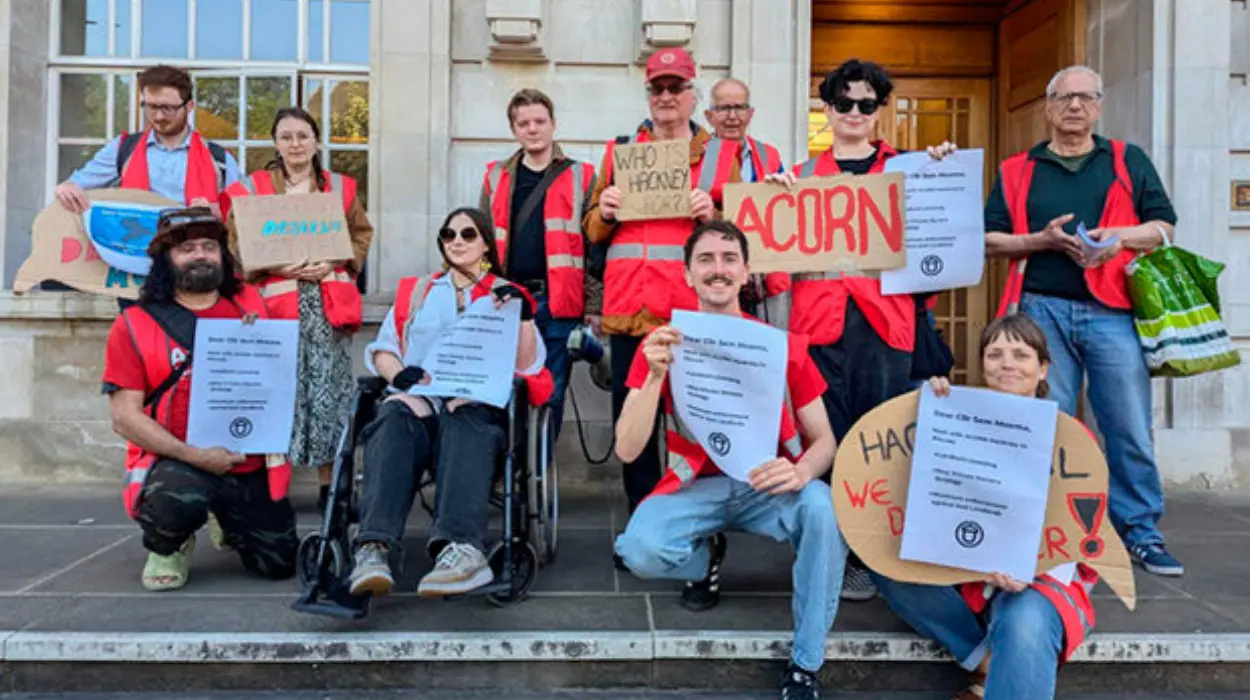Hackney (Parliament Politics Magazine) – Hackney Council is launching a public consultation on proposals to regulate the majority of private landlords, citing concerns over housing standards.
Regarding plans to require private landlords throughout the entire borough to obtain a permit before they may rent out properties, the Council has stated that it will speak with locals this summer.
The Town Hall waived through proposals to start the first phase of the Labour-run administration’s much anticipated and hotly contested “borough-wide” licensing program at yesterday night’s (April 28) cabinet meeting.
Members of the renters union, ACORN, who had come to the Town Hall steps with their letter to the borough’s private renting lead, Cllr Sem Moema, interrupted the meeting with heckles and jeers.
By the time the cabinet decided to proceed with statutory consultation, the campaigners were wearing celebration hats and flinging confetti from the chamber gallery.
In an interview with the Citizen, ACORN expressed their satisfaction with the council’s “first steps towards landlord licensing tonight” and their eagerness to work with the council to put the plan into action “as soon as possible.”
Council officers’ “conservative” estimate, according to Hackney’s Independent Socialist council members, was that the plan would generate £1 million for the local government.
Freddie Gentz, the union’s spokesperson, said this was “money directly needed in past years”.
“Many renters are asking why this is only being brought forward now,”
he said.
Hackney Council tested selective licensing programs in three wards—Brownswood, Cazenove, and Stoke Newington—between 2018 and 2023.
This meant that in order to rent out a single residence in such regions, landowners had to pay £500 and fulfill specific requirements to guarantee that the homes were properly maintained and up to code.
In 17 of the 21 wards in the borough, the council is now suggesting charging £925 for ordinary licenses.
A £1,400 license fee will be required of landlords who rent out some kinds of shared homes, also referred to as “houses in multiple occupation” (HMO).
Discounts for landlords whose buildings exceed energy-efficiency criteria and are accredited by the London Landlord Accreditation Scheme are also being considered by the council.
The action was taken nearly three years after Cllr. Moema and former Mayor Philip Glanville pledged to apply for the policy within two years during Labour’s local election campaign.
The number of privately leased homes in Hackney has risen in the past ten years, according to Cllr. Moema, who stated during the meeting that “too many residents feel they have no choice but to stay in substandard accommodation” due to increased demand.
A recent analysis of the borough’s housing stock, she said, showed that a sizable portion of privately rented residences had at least one major danger.
“We all know this is not acceptable,”
she continued, adding that this was “well above the national average.”
Despite acknowledging that the private rental market was inadequately regulated and had significant flaws, the deputy cabinet member noted that many Hackney landlords were “really key” to the borough’s housing supply by offering “well-maintained and responsibly-managed homes.”
She went on to say that the council had been able to pinpoint the locations of the most “egregious” occurrences thanks to the earlier pilot program, but that it was crucial that the council “hears from all sides before making any decision or jumping to conclusions.”
Four boroughs—Hoxton East and Shoreditch, Hoxton West, Haggerston, and Woodberry Down—are immune from selective licensing under the plans.
Together with Woodberry Down in Hackney’s northwest corner, these wards, which are located in the borough’s southwest, had a lower percentage of privately leased properties with significant dangers, according to an independent analysis conducted by Metastreet Ltd.
Cazenove, where selective licensing has already been tested, had the most private rental homes with significant dangers (615), whereas Hoxton West had the fewest (98).
ACORN disputed with the Citizen, however, that a landlord’s actions would be “determined by geography.”
“Considering licensing pays for itself, there is no incentive to leave any part of Hackney unlicensed other than to appease the landlord lobby,”
Mr Gentz added.
Liza, a union member, interrupted Cllr. Moema from the gallery after the meeting and told the Citizen that she had been on a “constant merry-go-round” trying to get the council’s many service teams to assist her with her rental problem.
Liza, who has been renting an HMO apartment for two years, reported that the floors were “falling over the place, even though I can’t walk properly and [the landlord] knows it’s a slip hazard for me.” Liza uses a wheelchair.
“What concerns me is that [the council] is talking about selective licensing, but they’re not even using their current mandatory enforcement powers,”
Liza said.
Before being interrupted by additional jeering from the gallery, Caroline Woodley, the mayor of Hackney, told the chamber that it was a “really great piece of work” that had required “persistence and patience.”
A Town Hall representative was unable to provide a more precise timeline when the Citizen asked the council this morning when the consultation is scheduled to begin in the summer.
What specific regulations are being proposed for Hackney landlords?
Before being rented out, all privately owned properties—including those that were not previously covered—would need a council license. Properties that are not Houses in Multiple Occupation (HMOs) fall under this category.
Before renting out their properties, landlords must make sure they adhere to the Decent Homes Standard, which covers fundamental health, safety, and repair standards.
By forcing landlords to keep their houses free from risks like mold and moisture, the program seeks to improve standards throughout the private rental industry. Those who disregard these issues may face fines or legal action.
Measures to improve safety and community well-being by lowering antisocial behavior associated with rental units will be part of the licensing requirements.

